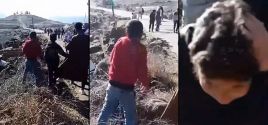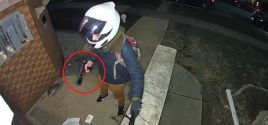Guantanamo captive 'worked with CIA': Asked how many of the inmates were real terrorists, Mr Khadr said: "Eighty per cent were innocent."BBCAug. 17, 2006 |
Popular 
IDF Opens Fire on Syrians Protesting Israel's Expanding Occupation of South Syria

Putin Accuses 'Ethnic Jews' of Tearing Russian Orthodox Church Apart

Saudi National Rams Car Into Germans at Christmas Market in Suspected Terrorist Attack [UPDATED 2X]

Ohio Senate Passes Bill Aimed at Outlawing Criticism of Israel, Criminalizing Gospel

Nick Fuentes Targeted by Gunman at His Home After Being Doxed on Elon Musk's Twitter [UPDATED]
 A Canadian man recently released from Guantanamo Bay in Cuba has been telling the BBC how he worked there undercover for the CIA. Abdurahman Khadr, the son of alleged former senior al-Qaeda member Ahmed Said, is now back in his native Canada. He left Guantanamo because he did not believe he was accomplishing his task - to identify al-Qaeda members and get them to give away information. Mr Khadr was initially detained in Afghanistan after the fall of the Taleban, and was first interviewed by British forces. He told the BBC he was held in a "series of jails" before agreeing to work with the CIA in Pakistan. "That didn't work out, and they decided to send me to Cuba to work for them there." The BBC asked the CIA for its reaction to Mr Khadr's comments but it said it would not comment on such matters. Frustrated Mr Khadr said he was handed over to the American troops on 12 March, 2003. He said he had two main objectives. The first was to recognise people and identify which were considered terrorists and which were innocent civilians. He said he managed to identify some of the Guantanamo inmates. His second objectives was to get suspected al-Qaeda members to talk to him. "They put me next to people who were stubborn and wouldn't talk to them, and try to talk these people into saying stuff to me," he said. "Then I would tell it to the CIA." But he said he had little success at this. "They put me next to one person, and he was as stubborn with me as he was with them." '80% innocent' Asked how many of the inmates were real terrorists, Mr Khadr said: "Eighty per cent were innocent. "Ten per cent were 'stubborns', who should be there and should be kept there forever, and 10% are people that might do something if they got out." Mr Khadr also described how it felt to be an inmate in Guantanamo. "You know that you cannot go anywhere and you are totally under the control of the person that's interrogating you. "Everything is in his hands. You can be the most co-operative person. But call him a "stupid American," or something that is personal, and he would write back to the Defense Ministry that this person isn't co-operating. They will keep you there for two or three years." Mr Khadr said the interrogators themselves had told him this. He also said that if some prisoners were stubborn but liked by the interrogators, they would be released. Mr Khadr said he mixed with the other prisoners for about three months. He got so depressed by his lack of success that he said on one occasion he tried to hang himself. As a result he was moved to the camp's psychiatric block. For a long time, his pleas to be released fell on deaf ears, he said. "Their explanation was always that 'you are having a good life, this is just a little while and then you are good... you will have money and everything'. "That's when I said 'take the money, keep it, just let me go. If you don't in one week I will talk - I will talk to everybody, the ICRC, the Canadians, even the MPs that come to the block'." Even so, he claims, the CIA promised he would be paid $3,000 for every month he worked undetected, plus a $5,000 bonus - but he was revealing his story because he had still not been paid anything. Mr Khadr's Egyptian-Canadian father, Ahmed Said, is thought to have been a senior member of al-Qaeda, who, in the 1980s, moved his family to Pakistan, then Afghanistan. Mr Khadr has said he personally knew al-Qaeda head Osama bin Laden. He also said his father, who is now dead, described him as a "cancer" as he asked too many questions. Mr Khadr said he was horrified by the events of 11 September 2001, but was told by his father the people who died were "collateral damage." He told the Outlook programme that although he was "worried" about reprisals from either the Americans or al-Qaeda, he did not feel in undue danger. "I believe in God, I believe in Allah very much. "I believe nothing will happen to me except what is written for me." |



